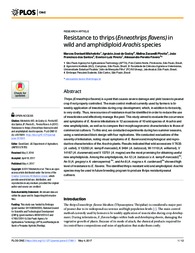Resistance to thrips (Enneothrips flavens) in wild and amphidiploid Arachis species.
Resistance to thrips (Enneothrips flavens) in wild and amphidiploid Arachis species.
Author(s): MICHELOTTO, M. D.; GODOY, I. J. de; PIROTTA, M. Z.; SANTOS, J. F. dos; FINOTO, E. L.; FAVERO, A. P.
Summary: Thrips (Enneothrips flavens) is a pest that causes severe damage and yield losses to peanut crop if not properly controlled. The main control method currently used by farmers is biweekly application of insecticides during crop development, which, in addition to its toxicity, is very costly. Thus, new sources of resistance must be identified in order to reduce the use of insecticides and effectively manage the pest. This study aimed to evaluate the occurrence and symptoms of E. flavens infestations in 12 accessions of 10 wild species of Arachis and nine amphidiploids, as well as to compare their morphoagronomic characteristics to those of commercial cultivars. To this end, we conducted experiments during two summer seasons, using a randomized block design with four replications. We conducted evaluations of the severity of infestation, noting visual symptoms of E. flavens and morphological and reproductive characteristics of the Arachis plants. Results indicated that wild accessions V 7635 (A. vallsii), V 13250 (A. kempff-mercadoi), K 9484 (A. batizocoi), Wi 1118 (A. williamsii), V 14167 (A. duranensis) and V 13751 (A. magna) are the most promising for obtaining useful new amphidiploids. Among the amphidiploids, An 12 (A. batizocoi x A. kempff-mercadoi) 4x, An 9 (A. gregoryi x A. stenosperma) 4x, and An 8 (A. magna x A. cardenasii) 4x showed high level of resistance to E. flavens. The identified thrips resistant wild and amphidiploid Arachis species may be used in future breeding program to produce thrips resistant peanut cultivars.
Publication year: 2017
Types of publication: Journal article
Keywords: Arachis species, Enneothrips Flavens, Peanut crop
Observation
Some of Embrapa's publications are published as ePub files. To read them, use or download one of the following free software options to your computer or mobile device. Android: Google Play Books; IOS: iBooks; Windows and Linux: Calibre.
Access other publications
Access the Agricultural Research Database (BDPA) to consult Embrapa's full library collection and records.
Visit Embrapa Bookstore to purchase books and other publications sold by Embrapa.

